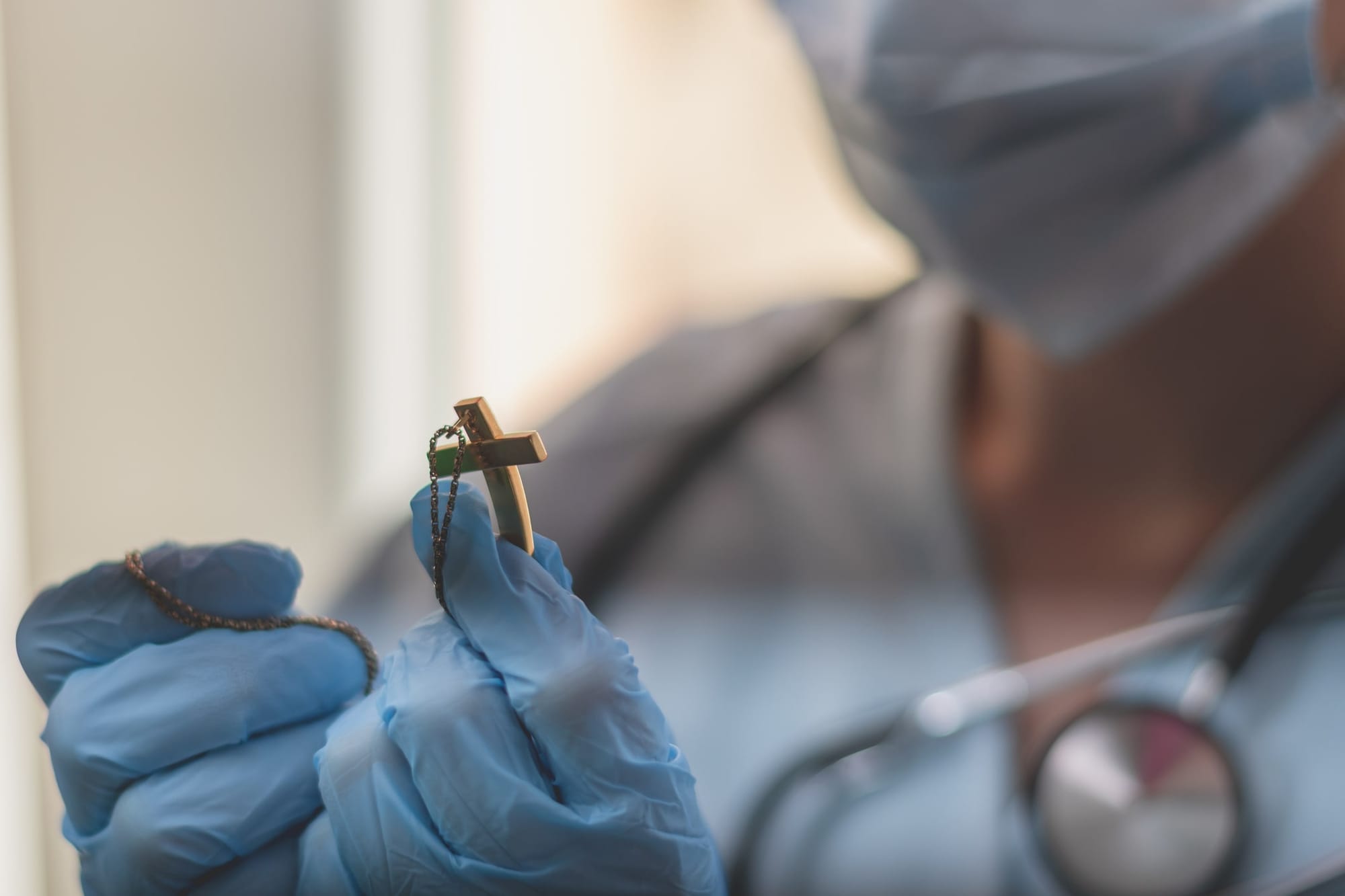
A recent poll conducted by University of Michigan researchers found 71% of the 2000 or so Americans surveyed (aged between 50-80 years) said they had religious beliefs that were important to them.
Of these, 19% reported their religious beliefs influenced their healthcare decisions in some way.
Further, while a significant majority of those 71% felt comfortable discussing these beliefs with their healthcare professionals, only 28% wanted to be asked about their religious beliefs as part of their healthcare.
Only a quarter of those surveyed said they had talked about their religious or spiritual beliefs with a healthcare professional.
All of this raises interesting ethical questions. Should doctors discuss religion with their religious patients?
The Michigan data shows some patients want this – but that doesn’t necessarily make it ethically justifiable.
To address these important ethical questions, it’s important to first clarify what is meant by “discussing” religion. This could range from simple measures, such as asking patients as part of the registration process whether they’re religious, to more involved discussions about what the patient’s religious beliefs involve and how these relate to their decision-making regarding their health.
In our article recently published in the journal Bioethics, we focus on these more involved forms of religious discussion with patients.
Is it ever ethically acceptable for doctors to discuss religion with their religious patients? And, if so, can we go so far as to say that doctors should be expected or obliged to do this?
Doctors avoid the discussion
One reason why doctors aren’t obliged to discuss religion with their religious patients is because it isn’t practical.
Studies have shown that doctors often avoid discussing religion with patients, mainly because many feel they lack the sufficient knowledge, time, and professional training to do so.
Interestingly, these studies have also found that doctors who learn about religion as part of their medical school curriculum and/or are religious themselves are the most likely to discuss religion with their patients, although some report avoiding discussing religion with patients whose religious beliefs are different to theirs.
Some may argue that to address the above concerns, training about religion should be routinely included as part of medical school.
While some basic training in this area could be included (for example, learning how to respond when patients bring up religion, or about the different ways in which religion may influence patients’ medical decisions), the level of training required for doctors to be considered as having religious expertise would be extensive and time-consuming, and take time away from the strictly medical aspects of their training.
This also applies to doctors who are themselves religious. Religion is complex and personal. Two individuals who follow the same religion may have very different religious beliefs and ideas about how to apply these beliefs to medical decision-making.
It’s not possible (nor, as we argue below, professionally desirable) for doctors to have sufficient religious expertise to be able to meaningfully discuss religion with all their patients.
Doctors are already pressed for time, and time spent discussing religion with patients is time that could be better used addressing patients’ medical needs.
Doctors should instead offer to refer patients to a different professional (for example, a chaplain), who is better-suited, given their training, expertise, and professional role, to discuss religion with patients.

The question of ethics
But while these practical problems might be thought to undermine the idea that doctors are ethically obliged to discuss religion with their religious patients, some might suggest that it can nevertheless be ethically acceptable for doctors to engage in such discussions where feasible – that is, where they have the requisite training, time, and resources to do so.
Yet even if it were feasible for doctors to engage in such involved religious discussions with their religious patients, there are good reasons why it would not be ethically acceptable for doctors to do so.
One reason for this is that such discussions would involve doctors overstepping the proper boundaries of their professional role, in ways that would unacceptably breach the scope of their “social remit” – the boundaries of what society has authorised them to do, as doctors.
During the secularisation of the medical profession in America in the mid-19th century, doctors who combined religious ethics or beliefs with medical decision-making came to be regarded as unprofessional.
In developing its pioneering code of medical ethics during the 19th century, the American Medical Association explicitly sought to separate doctors’ professional role from religion.
It’s not possible (nor professionally desirable) for doctors to have sufficient religious expertise to be able to meaningfully discuss religion with all their patients.
Members of a profession are granted a monopoly of expertise on the provision of key goods, which others in society aren’t trained or authorised to provide.
In return, professionals have an obligation to make their services broadly available to the community, not to pick and choose their clients or patients based on the practitioner’s personal preferences.
Doctors owe the community a readiness to provide the requisite medical services to enable patients to attain and maintain the key good of health, and the community justifiably expects any doctor to provide such services.
However, doctors haven’t been granted a monopoly of expertise on providing religious advice to patients. Providing such advice isn’t something the community can justifiably expect of each doctor.
Even if some doctors also have religious expertise, it’s not appropriate for doctors, in their capacity as doctors, to hold themselves out to the community – and to be regarded by patients as being – experts on religious matters.
A heavy burden of proof
Proposals to incorporate providing religious advice to patients as a mandatory (or at least ethically acceptable) part of doctors’ professional role must therefore meet a heavy burden of proof to establish that providing such advice should be added to doctors’ social remit.
The other side to our line of argument is that it might be suggested that because a patient’s religion (if any) is an important part of their overall wellbeing, doctors can justifiably address this as part of their social remit.
But while doctors might have a professional duty to ensure that their patient’s religious interests (if any) are addressed, this does not entail that it should be doctors themselves who directly address these interests.
Doctors can still help in indirect ways with ensuring that their patient’s religious interests (if any) are addressed – for example, by referring the patient to a chaplain and/or religious figure to consult with.
After all, doctors don’t have a duty to do anything and everything to promote their patients’ wellbeing. In these respects, chaplains could be regarded as another type of specialist a doctor might appropriately refer their patients to, when the relevant needs exist.





